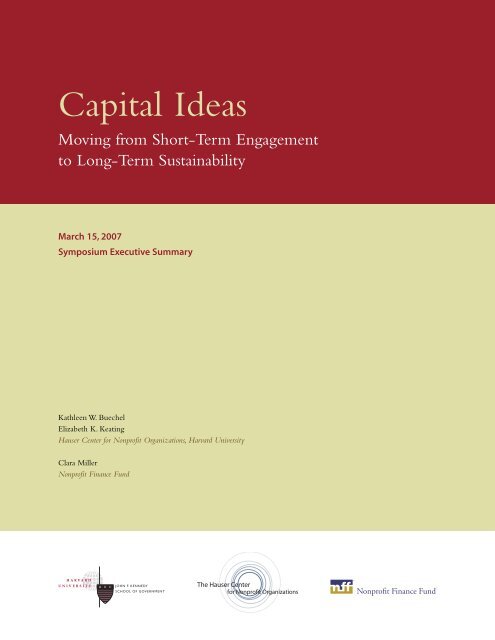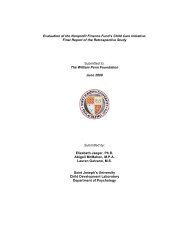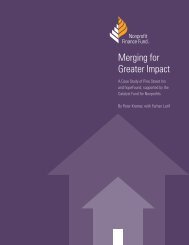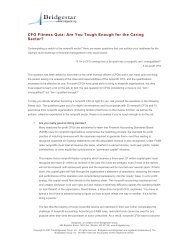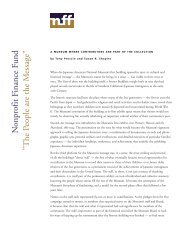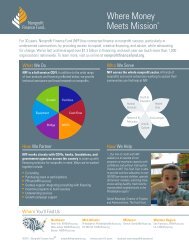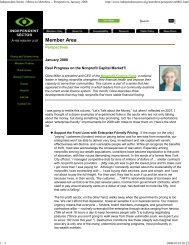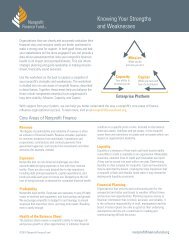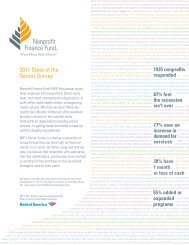Capital Ideas - Nonprofit Finance Fund
Capital Ideas - Nonprofit Finance Fund
Capital Ideas - Nonprofit Finance Fund
- No tags were found...
Create successful ePaper yourself
Turn your PDF publications into a flip-book with our unique Google optimized e-Paper software.
<strong>Capital</strong> <strong>Ideas</strong>Moving from Short-Term Engagementto Long-Term SustainabilityMarch 15, 2007Symposium Executive SummaryKathleen W. BuechelElizabeth K. KeatingHauser Center for <strong>Nonprofit</strong> Organizations, Harvard UniversityClara Miller<strong>Nonprofit</strong> <strong>Finance</strong> <strong>Fund</strong>®
The Hauser Center for <strong>Nonprofit</strong> Organizations atHarvard University and the <strong>Nonprofit</strong> <strong>Finance</strong> <strong>Fund</strong>recently hosted a gathering of funders, practitioners,and researchers to address an unusual topic: finance. OnMarch 15, 2007, more than 50 field leaders came togetherfor <strong>Capital</strong> <strong>Ideas</strong>: Moving from Short-Term Engagementto Long-Term Sustainability to voice their support for afundamental shift in the way funders support the nonprofitsector. Through shared stories, data, and experience,the group affirmed the need for change in the followingessential ways:• to broaden the scope from narrowly focused programfunding to funding that recognizes andaddresses the financial and organizational needs ofthe nonprofit organization as a whole, even if thatfunder is interested in only one part of the enterprise;• to identify the collective impact of funders’ financialpractices on an organization, and adjust accordinglythe application, stewardship, and reporting demandsmade of the grantee;• to move toward sectorwide results-based metricsthat encompass both organizational and fieldwidedimensions; and• to lower transaction and stewardship costs byencouraging funders to adopt simplified or standardizedreports, processes, and data in order to helpthe sector focus more resources toward achieving itsmission.The gathering reflected awareness that the sector canmake progress against difficult social problems only if philanthropy,government, individuals, and nonprofits are themselvesunited. Furthermore, grantee success requires adequate organizationalcapacity and financial resources. Following somesimple rules about how money works can help everyone inthe field get more value from the dollars they have. Currently,too many practices that are meant to increase nonprofit efficiencyin fact undermine it.Fieldwide change does not happen in one day, even withthe commitment of 50 highly engaged leaders. The grouprecognized the need to share these messages with the broaderconstituency that is now committed to a more effectivesocial sector. Participants drafted principles to inform fundingpractices that could strengthen both the operations andimpact of nonprofits.The group also considered other actionsteps to include more funders, foundations, charitable individuals,and government.Presentations and discussions focused on three framingquestions: “What is the problem, and how did we get here?What are we doing now to address it? What more can andshould we do?”What Is the Problem, and How Did We Get Here?To illustrate how we arrived at our current situation, thegroup heard about the “current services trap.” The currentservices trap is grounded in the urgency surrounding criticalsocial problems. Because the problems are urgent, it oftenappears that they are best solved by expending all availableresources with the aim of serving more and more people.This pressure to increase the volume of service delivery at allcosts overwhelms the capacity and systems that might helpthe organization stay in the game over the longer time periodrequired to really solve the problem. Money and effort areinvested only in the “now,” with little or no accrual of cashreserves or investment in the organization’s infrastructure. Atelling sign of this “current services” mentality is the fact thatmany nonprofits publicize that close to “one hundred percent”of any dollar given is spent on delivery of current services,suggesting that to do otherwise is wasteful. Many nonprofitsfall into that trap, and many funders—with the best ofintentions—unwittingly lead them to it.Speakers advocated ways to build organizational strengthfor the long term. To achieve this, significant changes areneeded in funding practices as well as in nonprofit operatingmethods. One of the funding community’s roles is to step backand look at how money or resources can contribute to solvingor alleviating social problems. <strong>Fund</strong>ers are the stewards offinancial resources and they have the responsibility to placethese resources strategically to address social needs. They relyon nonprofit organizations to fulfill those needs. The goalis to break the habit of being “sustainably broke” that permeatesthe sector, even among programmatically excellentorganizations.
What Are <strong>Fund</strong>ers Doing Now to Address the Problem?Most funders are already aware that even the nonprofits withexemplary programs struggle financially. Growth brings additionalchallenges. Some of these funders chronicled theirresponses to these issues in a pre-symposium survey. Thesurvey, which was sent to symposium invitees and membersof Grantmakers for Effective Organizations (GEO), collectedinformation on giving practices that aim to sustain nonprofits.(Survey results are available on the <strong>Capital</strong> <strong>Ideas</strong>Symposium website, www.isites.harvard.edu/k14620, and atthe NFF website, www.nonprofitfinancefund.org.)What did we learn from these funders? Their 82 responsesyielded four key areas of strong agreement:• Nearly 94 percent agreed that foundation relationshipswith grantees should change from oversight topartnership.• Ninety percent saw the need to simplify grant applicationsand reporting, to make grantee effort commensuratewith grant size and scope.• More than 80 percent concurred that foundationsshould jointly decide with grantees on evaluationtools and metrics, that most grants should have fewerline items and other restrictions, and that foundationsshould increase the size and length of grants, even ifthat meant that fewer nonprofits were supported.• Nearly 70 percent contended that standardizationwith other funders of grant applications and reportingis advisable.Views differed on the factors that prevent funders fromadopting financial sustainability practices and on how thesefactors could be overcome, yet all agreed that there are significantchallenges.A lack of expertise and models was frequentlycited as a barrier, as was the considerable staff time investmentnecessary to create new processes.Among the symposium speakers were funders that arealready taking action. Just a few examples:• The Pennsylvania Cultural Data Project (PACDP) isa collaborative common data platform developed byseven Pennsylvania-based funders. It streamlines costsand time required for nonprofits to apply for andreport on grants, and simultaneously creates a platformfor subsector-wide financial and program data.• The Allegheny County Department of HumanServices (DHS) in Pennsylvania pooled resources toincrease positive impact by collaborating with severalprivate foundations in the Pittsburgh region tointegrate services, build data systems, and pay for thefull costs of key social services.• Venture Philanthropy Partners (VPP) shared theirexperience in “equity investing,” making large,relationship-intensive and infrastructure-specificinvestments in Washington, DC, nonprofits.What More Can and Should <strong>Fund</strong>ers Do to MeaningfullySustain <strong>Nonprofit</strong>s?Participants discussed reengineering the funding practices toleave behind “the financial superstition, odd logic, and trustand estates-based compliance” that are too often viewed asfinancial best practices in the sector. In their place, speakersencouraged “enterprise and market savvy” principles thathelp the frontline organizations succeed in their missions andalleviate the real and punishing economic pressures they face.Speakers emphasized that all funders—foundations, intermediaries,and government agencies—must help build and sustainfinancially healthy organizations with robust organizationalcapacity.The participants called for greater engagement withgovernment and policy leaders at all levels, citing the need tochange the funding allocations, structures, and formulae ofcontracts and awards. Better accounting practices and financialliteracy were also advocated.The symposium participants generated ideas forimproved, enterprise-friendly practices, including draft fundingprinciples. These principles are overarching tenets forcollective or individual funder action to foster sustainability.The process was informed by the funder survey, the experienceof conference participants, the work of key funders, andthe written contributions of many experts in the field. Thesefunding principles are part of a living document that theparticipants hope will evolve with further input. The mostrecent version is provided here in Box 1.
BOX 1: Draft <strong>Fund</strong>ing PrinciplesCollective Approaches(NB: Collective approaches denote activities that rely on cooperativeaction among funders that removes barriers and supports fieldwidepractices that enable nonprofits to succeed.)1. Minimize the transaction costs for grantees and fundersof applying for and reporting on grants.2. Actively pool resources when more funds are requiredto achieve results.3. Reform the field’s overly complex and expensiveaccounting, regulatory, and contracting requirements.4. Create the culture, knowledge, and methods necessaryto enable nonprofits to succeed.<strong>Fund</strong>er-Based Approaches(NB: <strong>Fund</strong>er-based approaches denote activities that individualfunders can undertake alone.)1. <strong>Fund</strong> at the organizational rather than the programmaticlevel, even when your primary interest is in oneprogram.2. <strong>Fund</strong> to meet the organization’s business needs andoperating realities.3. Avoid frequent changes in funding priorities; signal exitor changes well ahead of time for grantees.4. Understand when you’re “building” or “buying,” andfund accordingly.5. Use evidence-based performance, learning, andorganizational health metrics to measure and reporteffectiveness.6. Small can be beautiful: make appropriately sizedinvestments and do not encourage growth forgrowth’s sake.In ConclusionIt was the common agreement of the participants that fundingpractices need to change collectively. All funders—atprivate foundations, intermediaries, and government—needto start to financially strengthen and maintain healthynonprofits, and build rather than undermine capacity whenproviding money. Collective action, shared practices, commondata, standard metrics, and a longer-term perspective arerequired.In tackling huge problems such as global warming,poverty alleviation, or racism, success relies on a moment ofdispassion. <strong>Fund</strong>ers must pause for a moment and reflect,“What does money—our primary tool—have to do withsolving these problems? How should this tool be used? Whatwon’t it do?” <strong>Nonprofit</strong>s and funders alike need to deliberatelybuild the bridge between mission and money to create amore robust social sector and even greater social good.
Hauser Center for <strong>Nonprofit</strong> Organizations, Harvard UniversityThe Hauser Center for <strong>Nonprofit</strong> Organizations is a university-wide research centerat Harvard University that seeks to expand understanding and accelerate criticalthinking about nonprofit organizations and civil society among scholars, practitioners,policymakers, and the general public by encouraging scholarship, developing curriculum,fostering mutual learning between academics and practitioners, and shapingpolicies that enhance the sector and its role in society.<strong>Nonprofit</strong> <strong>Finance</strong> <strong>Fund</strong>The only national community development financial institution (CDFI) focusedexclusively on nonprofits, <strong>Nonprofit</strong> <strong>Finance</strong> <strong>Fund</strong> (NFF) helps organizationsstrengthen their financial health and improve their capacity to serve their communities.WithNFF’s help, nonprofits build and renovate facilities, expand operations, fundgrowth needs, and sustain operations over time. NFF serves both nonprofits and theirfunders, offering an integrated package of financial and advisory services.ABOUT THE CONVENERSKathleen W. Buechel has worked for more than 16 years in philanthropy, most recentlyas president of Alcoa Foundation. She is involved in a number of civic and sectorwideorganizations including the Independent Sector. She is a visiting practitioner atthe Hauser Center for <strong>Nonprofit</strong> Organizations, where her focus is on advancingfunding practices that support the longer-term sustainability of nonprofits.Elizabeth K. Keating, CPA, PhD, teaches, writes, and consults extensively on nonprofitfinancial issues, including financial distress, financial disclosure, fraud, employeebenefits, overhead, and governance and accountability.Clara Miller is president and CEO of <strong>Nonprofit</strong> <strong>Finance</strong> <strong>Fund</strong> (NFF), a nationalleader in nonprofit, philanthropic, and social enterprise finance. She is a board memberof Working Today, GuideStar, GEO, and is a community development advisor forthe Federal Reserve Bank of New York. Miller speaks and writes extensively aboutnonprofit capitalization and finance, and has been published recently in Stanford SocialInnovation Review, the <strong>Nonprofit</strong> Quarterly, and Worth magazine.© 2007 by the Hauser Center for <strong>Nonprofit</strong> Organizations, Harvard University and <strong>Nonprofit</strong> <strong>Finance</strong> <strong>Fund</strong>
®This symposium was made possible by funding and support from the HauserCenter for <strong>Nonprofit</strong> Organizations at Harvard University and Alcoa, Inc.For additional informationVisit the <strong>Capital</strong> <strong>Ideas</strong> Symposium website, www.isites.harvard.edu/k14620,and the NFF website, www.nonprofitfinancefund.org.ContactKathleen W. BuechelElizabeth K. KeatingClara Millerkwb4752@verizon.netlizkeating@earthlink.netClara.Miller@nffusa.orgThe Hauser Center for <strong>Nonprofit</strong> OrganizationsJohn F. Kennedy School of GovernmentHarvard University79 John F. Kennedy StreetMailbox 143Cambridge, MA 02138NONPROFIT ORGUS POSTAGEPAIDBOSTON, MAPERMIT NO. 1636


